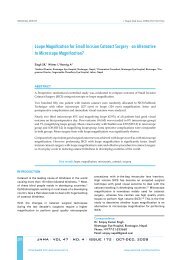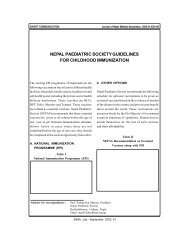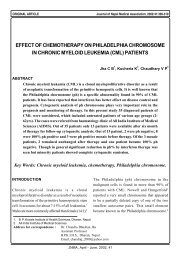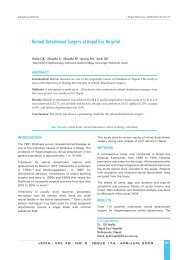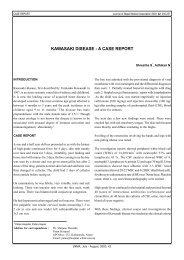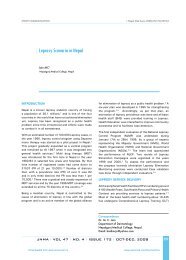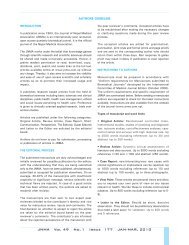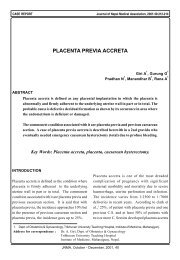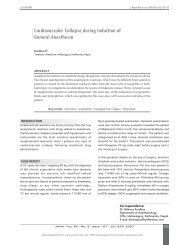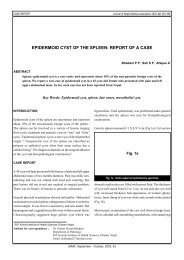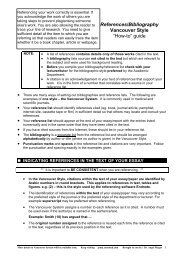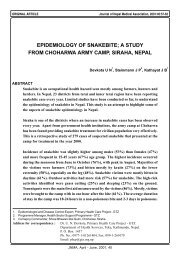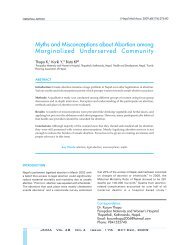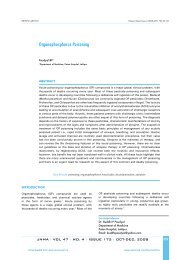C:\sujan\gurung\JNMA (143) Fina - Journal of Nepal Medical ...
C:\sujan\gurung\JNMA (143) Fina - Journal of Nepal Medical ...
C:\sujan\gurung\JNMA (143) Fina - Journal of Nepal Medical ...
You also want an ePaper? Increase the reach of your titles
YUMPU automatically turns print PDFs into web optimized ePapers that Google loves.
ORIGINAL ARTICLE <strong>Journal</strong> <strong>of</strong> <strong>Nepal</strong> <strong>Medical</strong> Association, 2002:41:368-374<br />
STUDENT FEEDBACK ON THE OBJECTIVE STRUCTURED<br />
COMPONENT OF THE PRACTICAL EXAMINATION IN PHARMACOLOGY<br />
Pathiyil R S 1 , Mishra P 1<br />
ABSTRACT<br />
The study was planned to determine the attitude <strong>of</strong> undergraduate medical students<br />
towards the objective structured practical examination (OSPE) in pharmacology and<br />
to investigate any influence <strong>of</strong> sex, nationality and medium <strong>of</strong> instruction at school on<br />
these attitudes. The second year undergraduate medical students <strong>of</strong> the Manipal college<br />
<strong>of</strong> medical sciences, Pokhara, <strong>Nepal</strong> were asked to complete a questionnaire regarding<br />
the spotters and communication skills component <strong>of</strong> the practical examination. Students<br />
considered OSPE a good method <strong>of</strong> practical examination. The male students agreed<br />
more strongly that the spotters develops the ability to choose an appropriate drug<br />
while the female students were more in favour <strong>of</strong> OSPE over animal experimentation.<br />
The Sri Lankan students were less in favour <strong>of</strong> the introduction <strong>of</strong> stations testing<br />
skills as part <strong>of</strong> OSPE and also disagreed strongly with the point that communication<br />
skills should be conducted in a language other than English. Based on these<br />
observations, changes should be made in the teaching as well as evaluation<br />
methodologies to maximize learning.<br />
INTRODUCTION<br />
Objective structured practical examination<br />
(OSPE) is being increasingly used not only in the<br />
developed world but also in developing countries<br />
like India and <strong>Nepal</strong> due to benefits like objectivity<br />
and reliability. 1 OSPE and the closely related<br />
objective structured clinical examination (OSCE)<br />
are preferred to other assessment tools. The<br />
problem to be solved is the same for all the<br />
examinees thus eliminating bias due to different<br />
problems given to different examinees. OSPE/<br />
OSCE has been shown to be a reliable device with<br />
a good capacity for discriminating between<br />
1. Manipal College <strong>of</strong> <strong>Medical</strong> Sciences, Deep Heights, Pokhara, <strong>Nepal</strong>.<br />
Address for correspondence : Dr. Ravi Shankar Pathiyil<br />
Department <strong>of</strong> Pharmacology, Manipal College <strong>of</strong> <strong>Medical</strong> Sciences<br />
P.O. Box: 155, Deep Heights<br />
Pokhara, <strong>Nepal</strong><br />
Email: pathiyilravi@rediffmail.com<br />
JNMA, July - September, 2002, 41
Pathiyil et. al. : Student feedback on the objective structured ... 369<br />
different categories <strong>of</strong> students. 1,2 Application <strong>of</strong><br />
the textbook knowledge to solve problems related<br />
to clinical practice can be better tested by OSPE/<br />
OSCE. OSPE/OSCE is a robust system <strong>of</strong><br />
examination with little threat to the validity from<br />
sources other than the performance being tested. 3<br />
The sub-components <strong>of</strong> the problem and the<br />
grading system are decided beforehand. All these<br />
makes OSPE/OSCE an ideal assessment tool in<br />
undergraduate medical education.<br />
OSPE in pharmacology requires the student to go<br />
through a series <strong>of</strong> stations (between 10-20),<br />
spending three minutes at each station. At the<br />
Manipal college <strong>of</strong> medical sciences, Pokhara,<br />
<strong>Nepal</strong> affiliated to the Kathmandu university OSPE<br />
stations account for 25 out <strong>of</strong> the 50 marks in the<br />
practical examination in Pharmacology. The OSPE<br />
consists <strong>of</strong> two parts: a spotter section <strong>of</strong> 20 marks<br />
and a communication skills section <strong>of</strong> 5 marks. At<br />
the spotter section a student identifies a drug among<br />
the choices displayed for a particular condition and<br />
then answers one or two questions related to the<br />
drug. At the communication skills station the<br />
student communicates with and prescribes a drug<br />
for a simulated patient. The student is assessed by<br />
an examiner, ticking a carefully prepared checklist.<br />
This form <strong>of</strong> examination is being used for<br />
formative evaluation in pharmacology in our<br />
institution for more than 6 years.<br />
The Manipal college <strong>of</strong> medical sciences, Pokhara<br />
has an international student body with students<br />
from <strong>Nepal</strong>, India, Sri Lanka and also non-resident<br />
Indians. We are actively considering testing the<br />
communication skills, history taking abilities and<br />
clinical skills <strong>of</strong> students using the OSCE/OSPE<br />
format and simulated patients. The students come<br />
from diverse social, cultural, economic and<br />
educational backgrounds.<br />
The aims <strong>of</strong> this study are:<br />
1. To evaluate the attitudes <strong>of</strong> medical students<br />
towards the OSPE component <strong>of</strong> the<br />
pharmacology practical examination.<br />
2. To evaluate the attitude <strong>of</strong> students towards<br />
procedure stations as part <strong>of</strong> OSPE component.<br />
3. To investigate any gender and nationality<br />
differences in these attitudes.<br />
4. To investigate any influence <strong>of</strong> the medium <strong>of</strong><br />
instruction in school on these attitudes.<br />
MATERIALS AND METHODS<br />
A survey was undertaken <strong>of</strong> 96 undergraduates<br />
during the second half (IV th semester) <strong>of</strong> the<br />
second year <strong>of</strong> their MBBS course. Students were<br />
asked to complete a questionnaire which asked<br />
them to consider the two OSPE components <strong>of</strong> their<br />
practical examination in pharmacology, namely:<br />
spotters and communication skills.<br />
In pharmacology it has been our experience that<br />
the non-OSPE components <strong>of</strong> the practical<br />
examination (namely prescription writing and<br />
problem solving) are showing bias in assessment<br />
due to various factors. Questions pertaining to the<br />
OSPE component are proposed to be increased and<br />
stations testing skills (as detailed afterwards) are<br />
proposed to be introduced. This is in accordance<br />
with trends in the west where OSPE/OSCE are<br />
increasingly replacing the traditional methods <strong>of</strong><br />
student assessment. 4,5<br />
The students were given a brief explanation <strong>of</strong><br />
the aims <strong>of</strong> the study, but were not told that the<br />
results would be analyzed for gender and<br />
nationality differences. The students were assessed<br />
by means <strong>of</strong> a standardized Likert type scale<br />
containing 10 items. The student was asked to<br />
grade each item using the following scoring<br />
system: 5- strongly agree, 4-agree, 3-neutral, 2-<br />
disagree, 1-strongly disagree.<br />
JNMA, July - September, 2002, 41
370 Pathiyil et. al. : Student feedback on the objective structured ...<br />
Responses were received from 70 students<br />
(72.92%) <strong>of</strong> whom 41 were male (58.6%) and 29<br />
were female (41.4%). Results were analyzed using<br />
the SPSS statistical package, and Mann Whitney<br />
test was performed as the test <strong>of</strong> significance.<br />
The questionnaire used for eliciting information<br />
is shown in table 1. The items put within the square<br />
brackets were used for further analysis <strong>of</strong> the<br />
different items with regard to differences in sex,<br />
nationality and medium <strong>of</strong> instruction.<br />
Table 1 : OSPE in pharmacology questionnaire<br />
RESULTS<br />
Table 2 shows the mean attitude score <strong>of</strong> the<br />
different items on the questionnaire. Students most<br />
strongly agreed with the points that both 'the<br />
spotters and the communication skill were a<br />
learning experience' and also with the points that<br />
'communication skills trained them to convey drug<br />
related information to the patient'. They felt that<br />
the time allotted for the station testing<br />
communication skills (3 minutes) was not enough.<br />
The gender analysis <strong>of</strong> students' attitudes towards<br />
OSPE in pharmacology is shown in Table 3. The<br />
male students agreed more strongly with the<br />
statement that the 'spotters component <strong>of</strong> OSPE<br />
develops the ability to choose a prescribed drug'<br />
(p=0.0169). The female students preferred OSPE<br />
JNMA, July - September, 2002, 41
Pathiyil et. al. : Student feedback on the objective structured ... 371<br />
Table 2 : Mean <strong>of</strong> the attitudes <strong>of</strong> medical<br />
students towards OSPE in pharmacology<br />
Table 3 : Gender analysis <strong>of</strong> students'<br />
attitudes towards OSPE in pharmacology<br />
to animal experimentation in pharmacology<br />
(p=0.044). There was also gender differences<br />
regarding the points that 'OSPE decreases the<br />
element <strong>of</strong> luck' (p=0.037) and that 'theory<br />
questions given to the students along with the<br />
spotters are a good idea' (p=0.0049).<br />
? p=0.0169, ?? p=0.044, p=0.037,<br />
p=0.0049, + p=0.049, + +p=0.036<br />
MEDIUM OF INSTRUCTION<br />
The nationality analysis <strong>of</strong> students’ attitudes<br />
towards OSPE in pharmacology is shown in<br />
table 4. The attitude <strong>of</strong> the Sri Lankan students<br />
towards the point 'theory questions related to the<br />
spotter are a good idea' was less favourable than<br />
that <strong>of</strong> the other nationalities (p=0.031). The Sri<br />
Lankans also scored less regarding the introduction<br />
<strong>of</strong> stations testing skills as part <strong>of</strong> OSPE (p=0.007).<br />
They also strongly disagreed with the point that<br />
'communication skills should be conducted in a<br />
language other than English' (p=0.0002).<br />
The English medium students were more<br />
favourable towards the point that 'it is confusing<br />
to switch from one problem to another within a<br />
short time period' (p=0.004). The vernacular<br />
medium students agreed more strongly with the<br />
point that 'communication skills teaches how to<br />
give non-drug information to the patient'<br />
(p=0.022). There were borderline evidence <strong>of</strong><br />
differences between the vernacular and English<br />
medium students regarding their attitudes towards<br />
the points that 'spotters is a reliable type <strong>of</strong><br />
JNMA, July - September, 2002, 41
372 Pathiyil et. al. : Student feedback on the objective structured ...<br />
Table 4 : Nationality analysis <strong>of</strong> students'<br />
attitudes towards OSPE in Pharmacology<br />
such a way that all the objectives <strong>of</strong> laboratory<br />
teaching can be tested. 1,6 In the west, group objective<br />
structured clinical examination (GOSCE) has been<br />
tried as a means <strong>of</strong> assessing medical students. 7<br />
The GOSCE format makes possible the assessment<br />
<strong>of</strong> a large number <strong>of</strong> students without the time and<br />
expense needed to evaluate students individually.<br />
Integrating a structured oral examination (SOE)<br />
in an objective structured clinical examination has<br />
been shown to increase overall reliability and<br />
examiner satisfaction. 8 SOE may be included as a<br />
component <strong>of</strong> communication skills assessment. In<br />
the revised curriculum <strong>of</strong> the Kathmandu university<br />
stations testing skills in pharmacology are proposed<br />
to be introduced and the attitude <strong>of</strong> students towards<br />
this development was generally positive.<br />
?p=0.031, ??p=0.007, p=0.0002,<br />
p=0.019, + p=0.021<br />
examination' and 'spotters develops the ability to<br />
choose a P drug' (p=0.064, p=0.059).<br />
DISCUSSION<br />
The objective structured practical examination<br />
(OSPE) is being increasingly used as an objective<br />
instrument for the assessment <strong>of</strong> the knowledge<br />
and skills <strong>of</strong> the medical undergraduates. It has<br />
been used for formative evaluation in the preclinical<br />
curriculum <strong>of</strong> the Kathmandu university<br />
for more than six years. It was adapted from the<br />
objective structured clinical examination (OSCE).<br />
The OSPE appears to be a reliable device with a<br />
good capacity for discriminating between different<br />
categories <strong>of</strong> students. It is better in these respects<br />
than the conventional practical examination.<br />
Moreover, it has the scope for being structured in<br />
Attitudes have a very strong influence on the<br />
behaviour <strong>of</strong> a person. 5 They form the link between<br />
knowledge and practice. The importance <strong>of</strong><br />
students’ attitudes towards the training program<br />
in undergraduate medical education is being<br />
increasingly recognized. The students’ attitudes<br />
towards medical college in general and<br />
pharmacology in particular have improved after<br />
the introduction <strong>of</strong> problem-based learning<br />
(PBL). 9,10 PBL also has other positive effects in<br />
terms <strong>of</strong> use <strong>of</strong> additional learning resources,<br />
interdisciplinary learning, team work and making<br />
learning fun. 10<br />
MEAN ATTITUDE SCORES<br />
Item wise scores indicate that the attitudes were<br />
favourable except towards the points that it is<br />
confusing to switch from topic to topic within the<br />
category spotters and item numbers 4 and 5 under<br />
the category communication skills. The spotters<br />
test a wide range <strong>of</strong> topics in pharmacology in no<br />
particular order and the students did not find this<br />
particularly confusing. The time allotted for the<br />
communication skills station is not enough and<br />
JNMA, July - September, 2002, 41
Pathiyil et. al. : Student feedback on the objective structured ... 373<br />
should be increased to at least 5 minutes. The<br />
students also suggested that the communication<br />
skills should be conducted after they finish the<br />
spotters component <strong>of</strong> the OSPE.<br />
GENDER ANALYSIS OF ATTITUDES<br />
It has been observed that there are gender<br />
differences in medical students’ assessment <strong>of</strong> their<br />
personal skill levels. 11 The attitude <strong>of</strong> male students<br />
towards the point that 'communication skill<br />
develops the ability to choose a P drug' was more<br />
positive. More female students preferred OSPE over<br />
animal experimentation and this could be related<br />
to the greater empathy <strong>of</strong> females towards animals.<br />
It could also be due to the greater number <strong>of</strong> Sri<br />
Lankans among the female students and the<br />
Buddhist reverence for life is well known.<br />
NATIONALITY ANALYSIS OF ATTITUDES<br />
subcontinent have been following a basically<br />
similar scheme <strong>of</strong> education. Practical exercises in<br />
Biology follow a different pattern in the three<br />
countries namely <strong>Nepal</strong>, India and Sri Lanka from<br />
where the majority <strong>of</strong> our students originate. In<br />
<strong>Nepal</strong> the students carry out dissections <strong>of</strong> frog,<br />
rabbit, cockroach etc. In India due to the increasing<br />
pressure <strong>of</strong> animal rights activists animal<br />
dissections are not being carried out in a number<br />
<strong>of</strong> colleges and students are only demonstrated the<br />
dissections by their teachers. In Sri Lanka the<br />
students do not carry out dissections nor are there<br />
any demonstrations. Previously there were<br />
dissections but they were withdrawn following<br />
opposition from the Buddhist clergy and animal<br />
rights activists. The preference <strong>of</strong> the Sri Lankans<br />
for OSPE over animal experimentation might be<br />
due to the influence <strong>of</strong> school education. These<br />
differences will need further studies to be<br />
elucidated.<br />
The observed differences except the point that<br />
communication skills should be conducted in a<br />
language other than English are difficult to explain.<br />
The Sri Lankans strongly felt that if communication<br />
skills are conducted in <strong>Nepal</strong>ese then they would<br />
be at a serious disadvantage. Language classes in<br />
<strong>Nepal</strong>ese could be a possible solution.<br />
MEDIUM OF INSTRUCTION DIFFERENCES<br />
The differences observed were contrary to<br />
expectations with the English medium students<br />
having a higher score towards the point that 'it is<br />
confusing to switch from one problem to another<br />
within a short time period'.<br />
The explanation for these differences emerged from<br />
a focus group discussion with the students after<br />
the analysis <strong>of</strong> the data. School education in<br />
English is a colonial legacy in most parts <strong>of</strong> our<br />
subcontinent. Students from different parts <strong>of</strong> the<br />
In the past after the completion <strong>of</strong> the OSPE<br />
exercise the different deficiencies/weaknesses were<br />
noted and communicated to the batch as a whole.<br />
The detailed break up <strong>of</strong> the results was shown in<br />
case <strong>of</strong> the spotters but not in case <strong>of</strong> the<br />
communication skills. After the analysis <strong>of</strong> the<br />
results <strong>of</strong> the study we show the detailed break up<br />
<strong>of</strong> the results <strong>of</strong> each student and discuss with<br />
individual students the lacunae observed and ways<br />
to improve them. The results till now have been<br />
gratifying. We are also trying out a system where<br />
the evaluation <strong>of</strong> communication skills is carried<br />
out by both peers and faculty and feedback from<br />
both is used for improvement. PBL has been shown<br />
to improve both the cognition <strong>of</strong> and motivation<br />
towards medical education 12 and the increased<br />
emphasis on PBL, communication skills and<br />
information technology skills in the revised<br />
curriculum <strong>of</strong> Kathmandu university is a step in<br />
the right direction.<br />
JNMA, July - September, 2002, 41
374 Pathiyil et. al. : Student feedback on the objective structured ...<br />
REFERENCES<br />
1. Nayar U, Malik SL, Bijlani RL. Objective structured<br />
practical examination: a new concept in<br />
assessment <strong>of</strong> laboratory exercises in preclinical<br />
sciences. Med educ 1986;20: 204-209.<br />
2. Famuyiwa OO, Zachariah MP, Ilechukuru ST. The<br />
objective structured clinical examination in<br />
undergraduate psychiatry. Med Educ<br />
1991;25(1):45-50.<br />
3. Gispert R, Rue M, Roma J, Martinez-Carretero<br />
J. Gender, sequence <strong>of</strong> cases and day effects on<br />
clinical skills assessment with standardised<br />
patients. Med Educ 1999;33(7):499-503.<br />
4. Joorabchi B. Objective structured clinical<br />
examination in a pediatric residency program. Am<br />
J Dis Child 1991;145(7):757-762.<br />
5. Kowlawit ZV, Hoole AJ, Sloane PS. Implementing<br />
objective structured clinical examination in a<br />
traditional medical school. Acad Med<br />
1991;66(6):345-347.<br />
6. Natu MV, Singh T. Objective structured practical<br />
examination (OSPE) in pharmacology-Students’<br />
point <strong>of</strong> view. Indian J Pharmacol<br />
1994;26:188-89.<br />
7. Elliot DL, Fields SA, Keenen TL, Jaffe AC, T<strong>of</strong>fler<br />
WL. Use <strong>of</strong> a group objective structured clinical<br />
examination with first-year medical students. Acad<br />
Med 1994;69(12):990-992.<br />
8. Amiel GE, Tann M, Krausz MM, Bitterman A,<br />
Cohen R. Increasing examiner involvement in an<br />
objective structured clinical examination by<br />
integrating a structured oral examination. Am J<br />
Surg 1997;173(6):546-549.<br />
9. Birgegard G, Lindquist U. Change in student<br />
attitudes to medical school after the introduction<br />
<strong>of</strong> problem-based learning inspite <strong>of</strong> low ratings.<br />
Med Educ 1998;32(1):46-49.<br />
10. Antepohl W, Herzig S. Problem-based learning<br />
versus lecture-based learning in a course <strong>of</strong> basic<br />
pharmacology: a controlled, randomized study.<br />
Med Educ 1999;33(2):106-113.<br />
11. Clack GB, Head JO. Gender differences in medical<br />
graduates’ assessment <strong>of</strong> their personal<br />
attributes. Med Educ 1999;33:101-105.<br />
12. Chandra D, Sharma S, Sethi G, Dkhar S.<br />
Pharmacotherapeutic education through problem<br />
based learning and its impact on cognitive and<br />
motivational attitude <strong>of</strong> Indian students. Eur J Clin<br />
Pharmacol 1996;51(1):1-5.<br />
?????<br />
JNMA, July - September, 2002, 41



